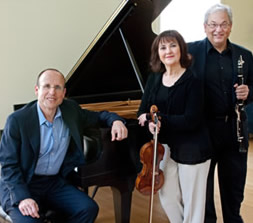This Preview has been provided by the Raleigh Chamber Music Guild.†
by Lawrence Bivins*
The noisy din at Philadelphia International Airport is typical of a Friday afternoon. Streams of weary travelers flow across miles of concourse as airline workers labor to convey information about delayed flights over failing public address systems. Some listening for their boarding calls multi-task over cell phones as they wait. Among them is Ani Kavafian, who, despite being eager to catch her short hop to White Plains, chats about the duties of violinist/violist for the renowned Kavafian-Schub-Shifrin Trio.
“This is our sixth season,” says Ms. Kavafian, whose ensemble will perform on January 9, 2011, at Raleigh’s Fletcher Theater as part of RCMG’s Masters Series. But she, clarinetist David Shifrin and pianist André-Michel Schub have known each other and played together for decades. “André and I have been sonata partners for years. I met David at Interlochen Music Camp as a young performer,” she recalls.
Critics and audiences have lauded the trio for its intricate attention to detail and fine balance. Forceful piano playing, for instance, might easily eclipse lines emitted by a clarinet and viola, both alto instruments. But such is never the case with Kavafian-Schub-Shifrin, whose integration relies on a thorough awareness each player has for the others’ styles. “We know each other and each other’s quirks–the good points and the bad points,” Ms. Kavafian explains. “It feels like we’re part of a family.”
The trio’s concert in Raleigh will include Bartók’s Contrasts for Violin, Clarinet and Piano, a three-movement piece that Ms. Kavafian calls “one of those incredibly classic compositions for this combination.” During the final movement, Ms. Kavafian performs on a “mal-tuned” violin as she conjures sounds represented by an out-of-tune folk instrument. Stravinsky’s Suite from “L’Histoire du Soldat” is a narrative depiction of a soldier’s experiences after placing an unwise trade with the devil. “It’s quite tricky rhythmically,” she says of the piece, which was originally scored for seven performers. Also on the program are William Bolcom’s Afternoon Cakewalk, which features a series of six rags, and Mozart’s well-known E-flat “Kegelstadt Trio.”
Ms. Kavafian says the repertoire for clarinet, piano and violin leans towards the 20th century. She cites prominent works for the combination by living composers like Joan Tower and Paul Schoenfeld. “Some of it is very contemporary,” says Ms. Kavafian, “but it’s contemporary with a tune.”
Visit www.rcmg.org/programs/masters/1011/Kavafian-Schub-Shifrin-Trio.htm to learn more about the Kavafian-Schub-Shifrin Trio Masters Series concert on January 9, 2011.
*Mr. Bivins chairs the Guild’s Marketing Committee. Reach him at evensong@bellsouth.net
†You may preview your event. Contact us for details.











